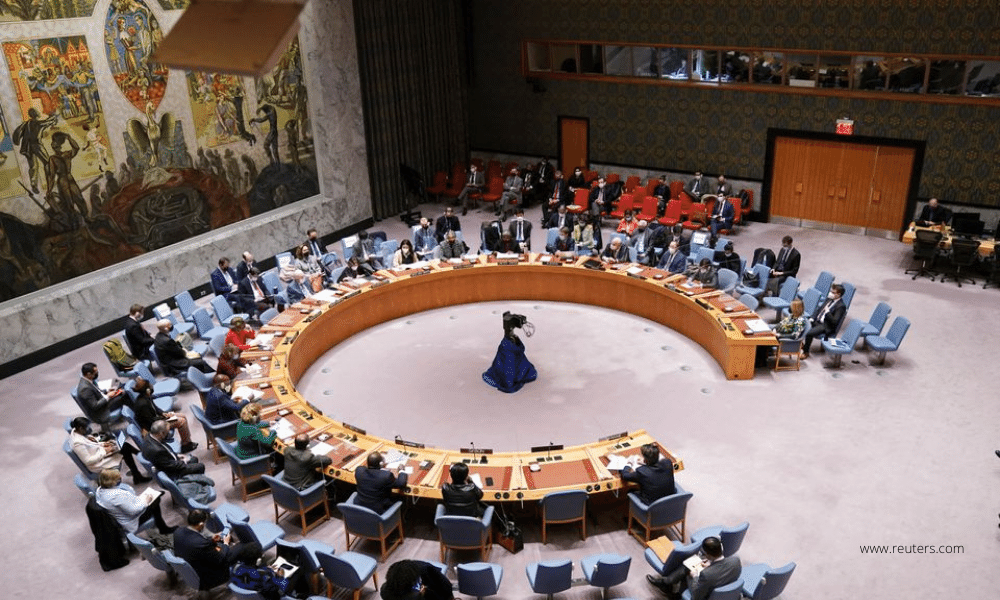
Summary
MOSCOW/DONETSK, Feb 22 (Reuters) - Russia faced the prospect of harsh new Western sanctions on Tuesday after President Vladimir Putin recognized two breakaway regions in eastern Ukraine and ordered the deployment of troops there, deepening Western fears of a major war in Europe.
Ukraine said two soldiers had been killed and 12 wounded in shelling by pro-Russian separatists in the east in the past 24 hours and reported new hostilities on Tuesday morning.
A Reuters journalist saw tanks and other military hardware moving through the separatist-controlled city of Donetsk overnight, but no insignia were visible on the vehicles.
Western leaders are trying to work out what Putin will do next, and whether Russia plans a full-scale invasion of Ukraine after massing troops near the borders of its ex-Soviet neighbor and demanding a redrawing of security arrangements in Europe.
Ukrainian President Volodymyr Zelenskiy said his country may break off diplomatic relations with Moscow. Russia's parliament was expected to ratify treaties with the two separatist regions on Tuesday, and rising fears of war pushed oil prices to a seven-year high on Tuesday, while safe-haven currencies including the yen rallied and stocks around the world tumbled.
Putin's announcement on Monday, and his signing of a decree on the deployment of Russian troops to "keep the peace" in the two breakaway regions, drew international condemnation. U.S. President Joe Biden signed an executive order to halt U.S. business activity in the breakaway regions and European Union officials met to discuss sanctions. The EU's top diplomat promised the first punitive measures on Tuesday.
"We've got to ensure that, whatever happens, Russia will feel the pain ... to make sure Russia has absolutely no incentive to go further," said Ireland's Europe minister, Thomas Byrne.
Linda Thomas-Greenfield, U.S. ambassador to the United Nations, said the description of the Russian troops as peacekeepers was "nonsense". "We can, will and must stand united in our calls for Russia to withdraw its forces, return to the diplomatic table and work toward peace," she told reporters after an emergency meeting of the White House Security Council late on Monday
A senior U.S. official said the deployment of Russian troops to the breakaway regions did not merit the harshest sanctions the United States and its allies have prepared in the event of a full-scale invasion, as Russia already had troops there.
Russian Foreign Minister Sergei Lavrov brushed off the threat of sanctions, saying the West would impose them regardless of events. "Our European, American, British colleagues will not stop and will not calm down until they have exhausted all their possibilities for the so-called punishment of Russia," he said.
Russia has denied planning to attack its neighbor but threatened "military-technical" action unless it receives sweeping security guarantees including a commitment that Ukraine will never join NATO. Russian foreign ministry spokeswoman Maria Zakharova said the recognition of the two regions did not affect Russia's readiness for talks with the United States, the Tass news agency reported.
WEST CONSIDERS ITS OPTIONS
Britain said it had drawn up sanctions to target those complicit in the violation of Ukraine’s territorial integrity, and those measures would come into force on Tuesday. A senior British minister said the situation was as grave as the 1962 Cuban missile crisis when a confrontation between the United States and the Soviet Union brought the world to the brink of nuclear war.
"You can conclude that the invasion of Ukraine has begun," Health Secretary Sajid Javid said. China said it was concerned and urged all parties to exercise restraint while Japan said it was ready to join international sanctions on Moscow in the event of a full-scale invasion. Turkey said Russian recognition of the two regions was unacceptable.
Syria's foreign minister said Syria backed Moscow's decision to recognize the two breakaway regions, state television reported. Syria has been beholden to Putin since his forces helped turn the tide of a civil war in favour of President Bashar al-Assad.
Russian-backed separatists in Ukraine's Donetsk and Luhansk regions - collectively known as the Donbass - broke away from Ukrainian government control in 2014 and proclaimed themselves independent "people's republics".
It was not immediately clear whether Russian troops would stay in territory controlled by the separatists, or seek to capture territory beyond them, a move that would increase the likelihood of conflict.
Putin has for years worked to restore Russia's influence over nations that emerged after the collapse of the Soviet Union, with Ukraine holding an important place in his ambitions. Russia annexed Crimea from Ukraine in 2014, triggering Western sanctions.